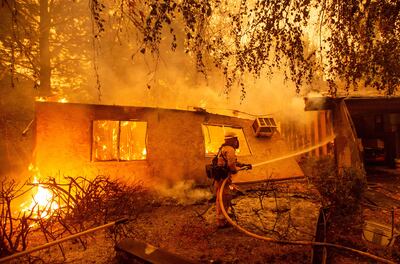At least a billion of the world's people already feel an “extreme impact” from climate change, new polling reveals.
Heatwaves, wildfires, hurricanes, droughts and poor air and water quality are fuelling concern around the world about the consequences of global warming.
A survey of 17 countries for the Global Methane Hub, which lobbies for emissions cuts, found a near-unanimous consensus that the climate is changing.
The findings covering more than four billion people – about half the world's population – were described as a show of support for green action.
People worried about the climate “have an appetite for meaningful change”, including cuts in methane emissions, said Natalie Lupiani of pollster Benenson Strategy Group.
“In my view, the data is a strong indication that people support their governments taking action to protect them against the rising global temperature,” she said.
Across the countries polled, 24 per cent said climate change had an “extreme impact” on their life – amounting to more than a billion people.
No country feels it more than Brazil, where 47 per cent report an “extreme impact” and heatwaves are viewed as the top concern.
More than a third (36 per cent) of those polled in India – the survey reached those with internet access – saw things as equally dire.
Even in Italy, concern over air quality and heatwaves means 22 per cent feel an extreme impact – on a par with Senegal.
Fewer people feel the effects are extreme in temperate countries such as Britain (9 per cent) and Germany (6 per cent).
Extreme weather a reality
Scientists warn that climate will become “more and more dangerous” with every further step of global warming, especially if it gets more than 1.5°C hotter than the pre-1900 norm.
Last year was the hottest on record at 1.45°C above the baseline, with temperatures in January and February 2024 also hitting new highs.
Extreme weather and wildfires have “ceased to be just part of future projections” and “for far too many of us, were a present reality” in 2023, said Jim Skea, the head of the UN's top science panel, during talks last week.
While slowing global warming to 1.5°C remains “possible within the laws of chemistry and physics”, that path could soon close “if we do not act now”, he said.
Even higher numbers feel climate change is already having some effect.
A majority (58 per cent) in India feel it is having at least a “strong impact”, along with 43 per cent in Italy and 36 per cent in the United States.

And 96 per cent of people across the countries surveyed agree the climate is changing, with 78 per cent attributing it to human activity.
Although there is less consensus on that point in the US, 60 per cent of Americans take the mainstream scientific view.
Almost 200 countries united behind a deal at the Cop28 talks in the UAE last year to revitalise efforts towards the 1.5°C target.
The summit produced its first ever pledge to “transition away” from fossil fuels as well as commitments to expand clean power sources.
Pollsters also asked about methane, a greenhouse gas that is highly potent at warming the planet, although unlike CO2 it does not linger for hundreds of years in the atmosphere.
They found that knowledge is mixed, with many people unaware of methane's impact on the climate.
Some of the countries who feel extreme effects from climate change, such as Brazil and India, were among the strongest supporters of methane cuts.
As of Cop28 more than 150 countries are part of a pledge to cut methane emissions by at least 30 per cent this decade. It is mainly produced from agriculture, landfill and oil wells.

